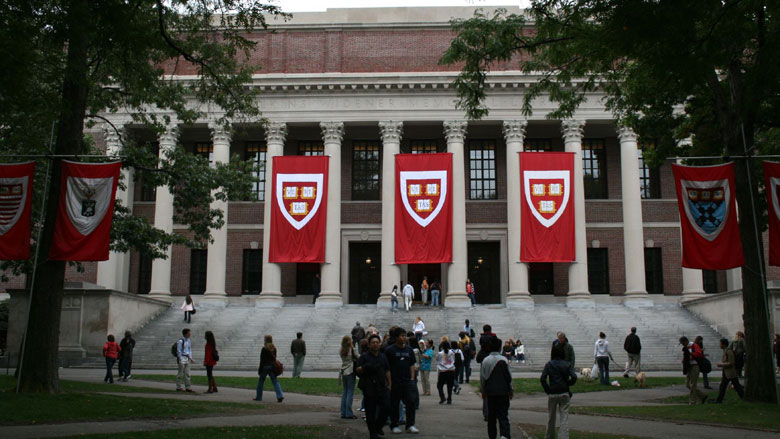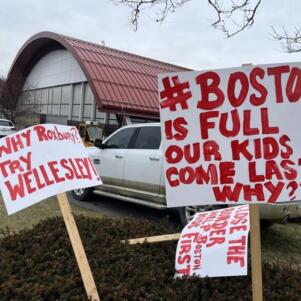Sexual assault surveys: Coming to a Massachusetts college near you?
By Evan Lips | February 2, 2016, 6:30 EST
 Harvard University Widener Library (Wikimedia)
Harvard University Widener Library (Wikimedia) BOSTON — Campus climate surveys, which supporters say can help schools identify the best practices for curbing sexual assault on campus, but which have been widely criticized by both conservative and feminist groups, could soon be coming to Massachusetts.
Last spring, state Sen. William Brownsberger (D-Belmont) authored a bill that calls for the creation of a task force assigned to develop campus surveys. The task force, consisting of rape crisis center representatives, government officials and college and university staffers, would then analyze survey results before “convening to determine future steps.”
Future steps “may include” revising the original survey, determining whether it should be “implemented repeatedly” and whether to issue recommendations to colleges.
State Rep. Lori Ehrlich (D-Marblehead), who petitioned for the bill along with Brownsberger, told Massachusetts Lawyers Weekly last August that the survey will provide another statistic that potential students will use to judge colleges and universities and which institutions of higher ed will use to create more hospitable environments.
The “benefit of this approach,” Ehrich said, ”is that the feedback from the survey would be uniform.”
But such surveys have created an uproar of criticism from the very people they intend to help — student survivors of seual assault. Specifically, feminists argue that the language used in surveys can be “triggering.”
According to the online journal Inside Higher Ed, some students at the University of Michigan said survey language “made them uncomfortable or even triggered dark memories of their assaults.”
Some policy analysts have other objections.
Carrie Lukas, managing director of the Independent Women’s Forum, doubts that the creation of a state-run task force will result in improvements.
“It may sound like a nice idea, but it seems unlikely that such a commission and yet another study will really help clarify the issue,” Lukas wrote in a Sept. 3 op-ed for the NewBostonPost. “One fears that the focus will be more on generating attention-grabbing statistics that hype the problem, rather than identifying anything that might actually discourage sexual misconduct in the first place.”
Ashe Schow, a conservative columnist who formerly worked at the Heritage Foundation and now writes for the Washington Examiner, has also questioned whether such surveys unnecessarily and needlessly expand the very definition of sexual assault.
“While on paper forced kissing sounds bad, think how this has been employed in movies without it appearing to be sexual assault,” Schow wrote.
Schow also identified another problem as survey respondents may not believe they were victims of sexual assault despite AAU’s survey parameters suggesting otherwise.
Schow pointed out that “nearly 60 percent of students who had responded to what [AAU] researchers defined as sexual assault did not report the incident because they did not consider it serious enough.”
The response rate for the survey as a whole was just 19.3 percent, “lower than several other surveys on sexual assault and misconduct,” surveyors acknowledged.
A year ago, Harvard University announced that, along with 28 other schools, it would participate in a national sexual assault climate survey led by the Association of American Universities.
“Our primary purpose in conducting this survey is to help our institutions gain a better understanding of this complex problem on their own campuses as well as nationally,” AAU President Hunter Rawlings said at the time in a prepared statement.
The results, according to AAU, show that one out of five female students surveyed claim they were sexually assaulted in some way while in college. AAU’s survey deliberately avoided using words like “rape” and “assault,” according to the report.
“When asking about sexual assault and sexual misconduct, the questions used descriptions of specific types of behaviors and tactics that constitute sexual assault and misconduct,” the report notes. “Words such as “rape” and “assault” were specifically avoided so that respondents would use a set of uniform definitions when reporting on the types of events that were of interest.”
As for Harvard’s participation in the survey, the decision to join the 27 other schools followed an August 2014 announcement by the U.S. Department of Education’s Office for Civil Rights that Harvard was one of 76 colleges and universities being investigated to determine if they violated Title IX in their approach to dealing with cases of sexual assault.
The cost of conducting the AAU survey, a report from InsideHigherEd.com indicates it wasn’t cheap, as the tab checked in at $85,000.
Harvard nevertheless completed the survey. The results, announced this past fall, were disconcerting, according to the school. Twenty-six percent of female undergraduates reported being victims at one point of non-consensual sexual contact, either through force or in situations when they were incapacitated, including when they were too drunk to make sound decisions. Another 12 percent reported experiencing incidents involving non-consensual sexual penetration. The survey’s response rate, at 53 percent, is tops out of the 28 schools that participated.
Harvard University President Drew Gilpin Faust described the results as “deeply disturbing.”
“The data reinforce the alarming frequency with which our students, especially but by no means only our undergraduates, experience incidents of sexual assault,” Faust wrote in a statement posted to the school’s website.
“They also underscore how many students lack confidence in how our institution will respond to reports of sexual misconduct — and how many lack adequate knowledge of the resources and support available to them in times of distress and need.”
Last spring, Boston University also voluntarily launched its own climate survey, although it was independent and unaffiliated with AAU’s.
In October, Brownsberger’s policy advisor, Anne Johnson Landry, posted to an update on the legislation to the senator’s blog, noting that the bill’s hearing last June before the Joint Committee on Higher Education garnered “favorable feedback.”
The October blog post was the last update on the matter and it is unclear whether leadership on Beacon Hill will make its passage a priority.
Rep. Tricia Farley-Bouvier (D-Pittsfield) told Massachusetts Lawyers Weekly that passing the proposal is a crucial first step to improving the campus climate.
“If we could only do one thing, the most important is the campus climate survey,” she said.
Contact Evan Lips at [email protected] or on Twitter at @evanmlips.
NBPCampus











